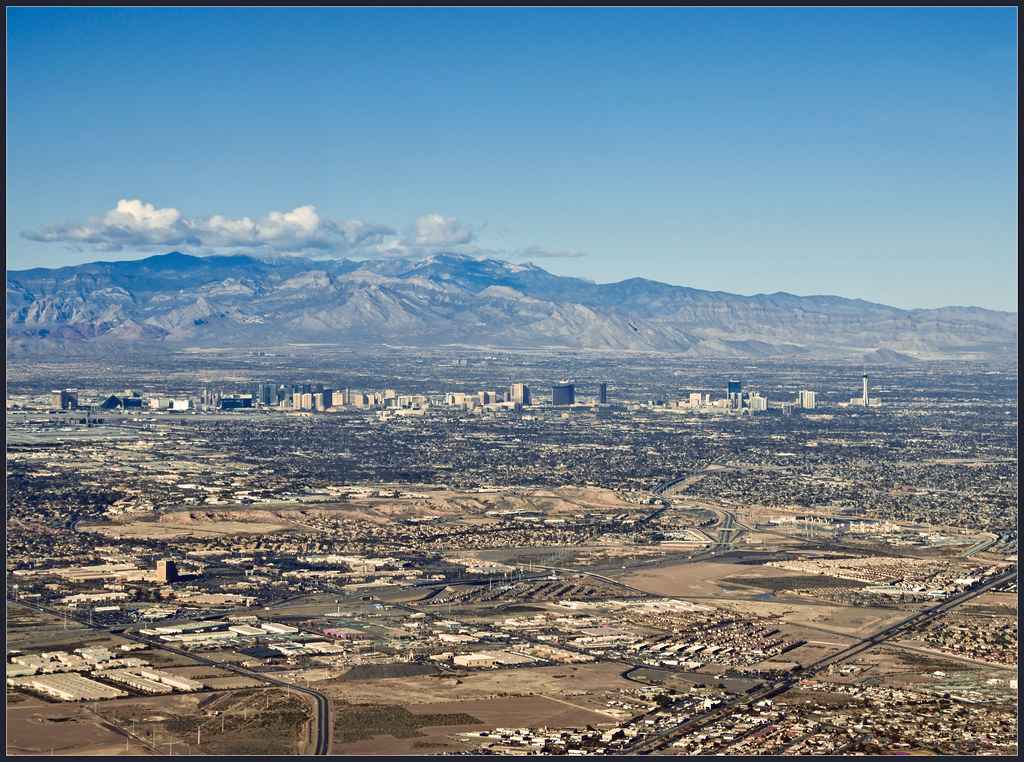Entries, exits, permits
A reflection on traveling through the globalized walled city.

Las Vegas. Image credit Bert Kaufmann via Flickr.
Doha had an eerie unnaturalness to it. Like existing in Jordan Peele’s Get Out. I had left the fake Venice of the Bellagio in Vegas only to find myself in a newer, faker, Venice in the Villagio in Doha.
The world exists in the same algorithm. I swear, there is the same coffee shop, in every corner of every city. Everything is just one giant “for you” page, ready to be scrolled.
At the airport in Doha, a woman tries to check in at the counter before me. She is dressed in a black flowing Abaya. The check in agent scans through her passport. After a few seconds he returns it back to her. “You do not have an exit permit from your sponsor.” He says. She stares blankly but knowingly at the agent, collects her passport back, and quietly moves to the side of the counter to give me access. Her face contains multitudes of emotions – a migrant worker caught in between, never completely staying, never completely leaving.
Las Vegas, United States
On this Friday I am wearing a blue jellabiya, and the Vegas wind swirls it around my body as I figure out directions to the mosque. A cab with a casino advert highlighted on its roof slows down in the middle of the street. A middle-aged man puts his head through the window and shouts towards me:
“Going to the mosque?”
This stranger gives me a five-minute lift to the mosque. Every minute or so, he slightly opens the door of the car mid-ride to spit some of the kolanut in his mouth, all this while ranting about Trump.
“He signs a paper and cancels everything. You know. Paper signed. He cancels me. Paper signs. He cancels you. Paper signs and everybody is sent away.” I do not say a word throughout the ride.
*
Another Friday, I walk on an almost empty campus when a red Toyota corolla that has been circling around the lot, speeds towards me with headlights fully on. A man winds down the side window and smiles at me.
“Yo! How do I get the fuck out of this school?”
LAX – Los Angeles International Airport
I am at the airport in LA on a phone call with Salma. There is a 9-hour time difference between our bodies, but the sound waves of our voices place our conversation in the same space. “You know, there are 7 million vending machines in the US” she casually mentions mid-sentence.
Now all I see are vending machines: a Kylie Jenner machine; a farmers healthy snacks machine, a 24 hours flower vending machine. Who will ever need to get a flower in the middle of the night?
When I sleep on the flight, there are vending machines haunting me in my dreams. I wake up, panting, connect to the in-flight Wi-Fi and google fun facts about vending machines.
Whenever in her lifetime Salma happens to visit Japan, I will call her and let her know once she lands in Tokyo: there is a vending machine for every 20 people in Japan! Ha!
Juba, South Sudan
On April 5, at the Juba airport in South Sudan, the United Stated deported a man in what became an international merry-go-round. South Sudan refused his entry, insisting that he is Congolese, and then deported him back to the United States. In response, Marco Rubio threw a tantrum and banned all visas of South Sudanese passports, plus sent this man again back to South Sudan. Because Africa is a country.
I have a printed picture of Makula Kintu pasted on my work desk. He is wearing a red t-shirt and a grey jacket on top of it. He has his fingers clasped together, his mouth agape, like a meme of astonishment.
For his first flight, he had been deported from the United States to South Sudan via Egypt Air, which means over the days he had been moved around from the US, through a connecting flight in Cairo, and then another flight from Cairo to Juba in South Sudan. For his second trip, from Juba, he would then have been returned through another intermediate country and then back to the United States where he would be denied entry at the border.
For a third trip, Makula Kintu was then again returned back, from the United States connecting through another country and again to Juba where he was finally kept under detention. Makula had first entered into the United States in 2003.
In all the news articles about Makula Kintu, he is not provided a voice by the press. Airport officials, foreign secretaries; custom and border agents speak for him. This is the only picture of him used in all the press filings – mouth agape and confused. In all of those flight miles he collected over days, no journalist asked Makula Kintu even if it is just for his opinion on how terrible the in-flight meals can be.
*
On different coordinates, on different maps, stories repeat. Cities absorb other cities, vending machines multiply like viruses. Humans are trapped in bureaucratic loops. The world is a continuous scroll: how do we get out? How do we make the algorithm stop repeating itself? In every existence, there are black bodies bearing witness.



















